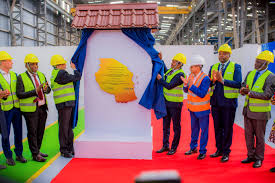DAR ES SALAAM, TANZANIA — In a major boost to Tanzania’s industrialization drive, ALAF Limited has launched a new Color Coating Line (CCL) with an annual production capacity of 75,000 tons, aiming to strengthen local manufacturing, reduce steel imports, and position the country as a regional hub for coated steel exports.
The new facility, launched on June 3, 2025, is located in Dar es Salaam, Tanzania’s commercial capital. The plant is expected to produce a wide range of roofing and cladding solutions, including Maxcover, Resincoat, Tekdek, Covermax, and tile profiles, which are essential materials in the construction sector.
The CCL is designed to reduce Tanzania’s dependency on imported pre-painted steel coils, increase the availability of high-quality steel sheets locally, and enable regional exports across East and Southern Africa.
Industry and Trade Minister Hon. Dr. Seleman S. Jafo, who officiated the launch, hailed the project as a key milestone in Tanzania’s economic transformation.
“This investment reflects our national goal of driving industrial growth and job creation. It will not only reduce the inflow of substandard steel products but also boost Tanzania’s competitiveness across the region,” Dr. Jafo said.
The development comes as part of the country’s Third Five-Year Development Plan (FYDP III) 2021/22–2025/26, which prioritizes industrialization, export expansion, value addition, and job creation as critical pillars of economic growth.
The plan envisions increasing manufacturing output by tapping into Tanzania’s natural resources, improving local processing capacity, and encouraging private investment in strategic sectors.
With the new CCL, ALAF becomes the first domestic manufacturer to deliver locally produced color-coated steel at this scale, providing significant advantages in terms of cost, lead times, and quality assurance. This move is expected to significantly reduce the volume of imported steel coils and create more value-added products within Tanzania.
Export Opportunities and Regional Integration
The products from the new facility are not just intended for the domestic market. ALAF plans to serve neighboring countries such as Kenya, Uganda, Rwanda, Burundi, Zambia, Malawi, and Mozambique, strengthening Tanzania’s trade links within the East African Community (EAC) and Southern African Development Community (SADC).
This aligns with regional goals for industrial integration, infrastructure development, and cross-border trade facilitation. By producing high-demand construction materials locally, Tanzania also enhances its export earnings, foreign exchange reserves, and industrial competitiveness.
Government Support and Industrial Policy
The government has reiterated its commitment to supporting industrial investments through policy stability, infrastructure upgrades, and stricter enforcement against substandard imports, which often undercut local producers.
“We are determined to ensure that imported products do not undermine local industry. ALAF’s investment is a demonstration of the confidence the private sector has in Tanzania’s manufacturing future,” Dr. Jafo added.
The Minister also noted that the plant would create direct and indirect employment, stimulate supply chain development, and contribute to skills transfer and technology adoption in the manufacturing sector.
Private Sector Role in Economic Diversification
ALAF, a key player in Tanzania’s steel manufacturing sector, has positioned itself as a catalyst for the country’s construction and infrastructure growth. With growing urbanization and housing demand across the country, the availability of locally manufactured roofing solutions is seen as critical for national development.
Industry players have welcomed the move, noting that it will stabilize prices, reduce construction costs, and enhance build quality through access to durable, coated roofing materials suited for the local climate.
Conclusion
The commissioning of ALAF’s Color Coating Line is a significant milestone in Tanzania’s industrial journey, underpinned by strategic policy and growing private sector confidence. It marks a shift toward self-reliance in industrial inputs, boosts regional trade potential, and contributes to the country’s 2030 development goals.
As Tanzania continues to invest in local value addition, projects like this are expected to transform the economy, generate employment, and integrate the country deeper into Africa’s industrial and construction value chains.
